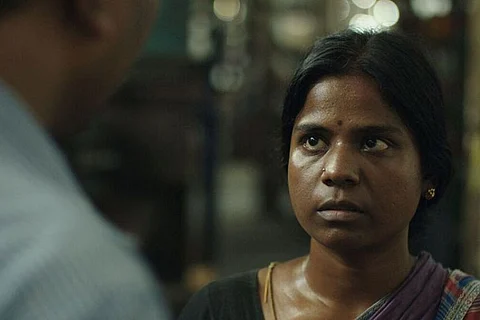

There is little chance that Sivaranjani And Two Other Women will surprise you. If you are looking for a link to connect the three stories in this anthology, you will find one soon enough. All three women – the two others are Devaki and Saraswathy – are married and living in Tamil Nadu, but belong to different periods of time. You can dig and find more connections but there is a certain predictability when it’s the insides of homes and the day to day moments that’s captured on camera for you. A predictability that can either tire you or else bring you close to one or more of the women.
Saraswathy’s (played to perfection by Kalieaswari Srinivasan) story begins in 1980 when she lives with her abusive, unloving husband and baby girl, in a lower middle class setup, borrowing the rice she has to cook for her unresponsive husband. He is the man we have seen on the road, walking ahead of his family, unwilling to carry the bags his wife holds in one hand while supporting the baby on her shoulders. He is the man who comes to slap his wife and drag her around the house because she talked back once and made a logical point. The difference you see in Saraswathy is when the all-bearing wife issues a simple but strong order on a night he beats her too much. “Stop beating me,” she says, a finger pointing at him, eyes meeting eyes till Saraswathy walks away. He is frozen for a minute before he behaves like a defeated man, not talking, not answering, just carrying on with the routine he has known.
Parvathy as Devaki appears to have chosen a character who is a lot like her and therefore delivers an effortless performance. It’s 1995, 15 years since Saraswathy’s tale began, and Devaki is much bolder. She does not stand the least bit of oppression and does not depend on another for anything small or big. You see that in an ordinary event as getting a ball from a difficult-to-reach spot for the little nephew. The nephew declares he would only marry Chithi when he grows up. It is through him you see that whole segment. You don’t know what happens to Devaki when he leaves the scene. But then a trivial observation he makes – “Chithi writes a diary” – becomes a major discussion in the family, which accepts the working woman that Devaki is, but cannot understand her need for privacy. Even the progressive husband is dragged into the narrow ideas his family raises.
When you skip 12 years further ahead to 2007, you expect life to have changed a lot for women giving up on dreams and turning homemakers. Sivaranjani, in that way, is perhaps the disappointing segment of the lot, if what you were expecting and hoping for was to see some sort of resistance. Sivaranjani (well played by Lakshmi Priyaa Chandramouli) is the pride of her college, the trophy-winning athlete her teachers have big hopes for. A little before a national championship, however, Sivaranjani’s parents marry her off, and even after her teachers tell her to be cautious, she gets pregnant. The championship is forgotten, being an athlete is forgotten. Nine years later, her life is full of the daily rush - packing a girl off to school and a husband to office and satisfying the whims of a fussy mother-in-law. The husband is the irritating character who sits in one place and demands that Sivaranjani bring him the wallet and the glasses and the breakfast and the socks while she runs between the kitchen and the daughter who needs to be fed. There is not a moment when she complains. It is only a deep sigh at the end of it all. It becomes clear that she is discontent with life only when she goes in search of past glories. It is just sad that the gratifying moment in her life comes when she succeeds in chasing a bus to give her daughter the tiffin box she forgets to take.
Director Vasanth chooses to tell the stories of all three women through the details of a day, and then the day after, and the day after that. It is not the kind of movie that sets a pattern with the first few scenes and then brings the twist in the tale. Vasanth’s films just show us the same kind of days as they would be in real life, no unexpected incidents waiting outside your door. While it is appreciable, the realism somehow doesn’t touch you the way you might expect it to. These could be the stories of women we know, have heard of. But the monotony of everyday life does not help to make that special bond between the viewer and the women of the movie. You know it, you see it at houses you visit, among families you are related to.
You don’t even need overnight heroes, where the women suddenly hit back at their oppressive in-laws and husbands. It is nice to see Vasanth not making them so. It is enough to be Saraswathy, to simply put a question to her husband and then continue to live when life seems unlivable. It is enough to be Devaki, who has always been a fighter, and continues to be so. Hers is perhaps the best segment in the film, especially for the way it’s told, through the perception of a little boy.
Reduce the monotony a little, show a day in place of several following the same routine of a life without dreams or hopes, show subtle tiny achievements for women like Saraswathy to go back home with. Show that the years passing might have changed the ways of life, and not produce more Sivaranjanis, whose tales only seem to say nothing has changed for women who forgot to ask questions.